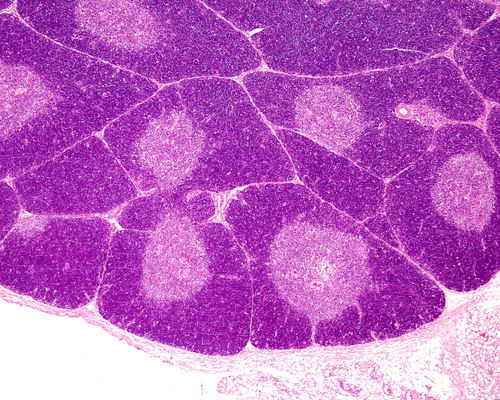Scientists identify survival protein- the clue to immune cell recovery following chemotherapy
The Walter and Eliza Hall Institute of Medical Research News Mar 06, 2018

Chemotherapy decimates the thymus, an immune organ responsible for training T cells, a type of white blood cell that protects us against infection and cancer. This damage leaves patients extremely susceptible to infection.
Institute scientists have identified a protein that is essential for the survival of a specialized kind of thymus cell called thymic epithelial cells (TECs). TECs control the thymus and its ability to regenerate after damage, and are integral to the training and development of T cells.
They hope the discovery will lead to future treatments that protect or regenerate the thymus after cancer treatment.
At a glance
•Chemotherapy severely damages the thymus and T cells, leaving patients susceptible to serious infections.
•Researchers have identified a protein that is essential for the survival of specialized thymus cells.
•The finding could lead to future treatments that protect or regenerate the thymus after chemotherapy.
Stem cell transplant side effects
The research was led by associate professor Daniel Gray and Dr. Reema Jain, with colleagues at the Institute, and was published in the journal Blood.
Associate professor Gray said a desire to improve patients' immune systems following chemotherapy had been the motivation for their research into the thymus.
“The treatment that some cancer patients receive in the lead-up to a bone marrow or stem cell transplant kills their cancer cells, but also causes a lot of collateral damage to the immune system and their thymus,” Gray said.
“Patients are then given a drug—called G-CSF—that replenishes some types of white blood cells that fight infection. However, there is no drug to replenish their T cells, and it takes many years for their T cells to recover, and for some people this never happens.”
Years without an active thymus and T cells leave people susceptible to opportunistic infections.
“These individuals often succumb to viral infections because T cell recovery is too slow. We are hoping to uncover a way of replenishing these T cells by protecting or regenerating the thymus, which is essential for T cell repopulation,” said Gray.
TECs are the key
TECs are believed to play a central role in maintenance and recovery of the thymus.
TECs were essential for the immune system because they teach and control the development of T cells, Dr. Jain said.
“These cells have, until now, been a bit of a ‘black box’ because there are so few of them and they are very hard to study for technical reasons,” she said.
Having overcome these technical difficulties, the research team was able to uncover the critical molecules that controlled the life and death of TECs.
“We found that an important pro-survival protein, MCL-1, was essential for the maintenance of TECs. If we removed MCL-1 from these cells, not only did the TECs die, the whole thymus basically disappeared. Without MCL-1, the thymus collapses and can no longer produce T cells,” Dr. Jain said.
Regenerating the thymus
Associate professor Gray said increasing the levels of MCL-1 in TECs to increase their survival could be one way of regenerating the thymus.
“By understanding the key molecules that drive the survival of TECs, we could develop treatments that protect the thymus during chemotherapy, or promote its regeneration after treatment,” he said.
-
Exclusive Write-ups & Webinars by KOLs
-
Daily Quiz by specialty
-
Paid Market Research Surveys
-
Case discussions, News & Journals' summaries